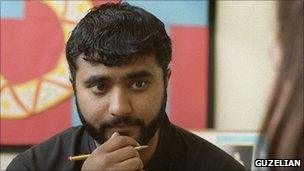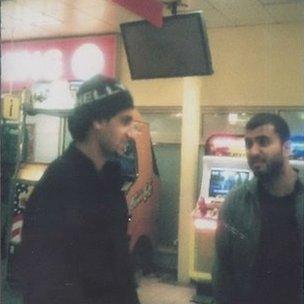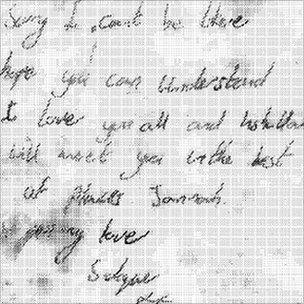Profile: Mohammad Sidique Khan
- Published

7/7 ringleader Mohammad Sidique Khan: Pictured working as a learning mentor
Mohammad Sidique Khan, a 30-year-old married father-of-one, was the oldest of the four suicide bombers - and the head of the plot.
Born in the UK to Pakistani parents who had become British, Sidique Khan, as he was more generally known, spent his life in Leeds, Batley and Dewsbury.
He was the youngest of six and he grew up in Beeston, a deprived, ethnically mixed area of Leeds.
Friends recalled a Westernised young man who called himself Sid.
After school, he worked for the Benefits Agency before starting a business studies degree at Leeds Metropolitan University. There, he met his future wife, Hasina, a British Muslim of Indian origin. Despite initial disapproval from their families, they married on 2 October 2001 and had a daughter in May 2004.
Mentor
The couple moved out of Beeston to nearby Batley, and then to Dewsbury, but remained a part of the local community through his work as a primary school teaching assistant and youth worker.
His role at the school was that of "learning mentor", working with children who were struggling with work, as well as those with behavioural problems.
By the time he began this job in 2001, he had become more curious about his Islamic faith and world politics. Information gathered by the police indicates that he had flirted with various strands of more hardline thinking - and his own brother is said to have tried to dissuade him from getting involved in the now-banned Al Muhajiroun Islamist groups.
He told associates that he had turned to religion after a far from blameless youth. He had been involved in drugs and had a number of run-ins with the police, including cautions for assault and receiving stolen goods.
It's not clear exactly when his public views hardened to the point of extremism but evidence and anecdotes suggest that his views were formed by 2001.
Home video of 7/7 bomber Mohammad Siddique Khan saying goodbye to his daughter
Around this time, West Yorkshire Police were already monitoring a number of suspected extremists. Khan attended a camp in the Lake District with these men. He was secretly filmed by the police, but detectives were unable to identify him at the time.
Those associations continued and he became involved in a local bookshop, Iqra, and also in a gym for local disaffected youth. He would help to organise camping trips and other youth-work diversionary activities.
Khan saw religion as an important community tool, offering an anchor to local teenagers through gym clubs at a local mosque and a community centre.
'Brainwashed'
But his real views were beginning to emerge.
Mark Hargreaves was an outdoor pursuits instructor who worked with Khan on some of these activities.

2004 surveillance photo: Khan (right) and Shehzad Tanweer watched - but unidentified - by MI5
"My lasting memory of him was that he has been brainwashed," he said. "He was totally over the top.
"Every opportunity to bring Islam into a conversation would be manipulated, anything at all. We were sat in a cave, for instance, it was very cold and dark, and he used that as an opportunity to explain to me how the light of Islam could come into my life, and it was constant, it was just a constant barrage of these kinds of things. After a while, it became quite tiring."
One of the pupils that he mentored later told police of a conversation at the bookshop, during which Khan said people would "pay" for what had happened to Pakistan.
Khan had bought into the anger over the state of his parents' homeland and, in particular, the continuing conflict over Kashmir.
Khan's journey to suicide almost certainly started as a fund-raiser for the Pakistani mujahideen, collecting cash in communities and handing it over to higher-level contacts who would organise its shipment across the world.

The note Khan left for his wife and daughter
In 2001, Khan and his close friend Waheed Ali travelled to a camp in Kashmir run by Harakat ul-Mujahidin, a militant group. From the camp, they crossed into Afghanistan, reaching the Taliban's front line with the Northern Alliance. They returned home days before the 9/11 attacks on the US.
But his extra-curricular activities also destroyed his career in education: He was sacked in 2004 after increasingly poor attendance.
In the early stages of 2004, Khan was in the thick of extremist activity in the UK - and appeared four times on what the Security Service describes as the "periphery" of another investigation. MI5 was watching Omar Khyam - a man later jailed for plotting a massive fertiliser bomb attack. Khan met him repeatedly in February and March, asking for advice.
The men had first met in 2003 when Khan had again attended a training camp in Pakistan with British jihadists.
Khan put off his plans to leave for Pakistan because his wife was pregnant. Their daughter was born in May 2004.
Khan delayed his plans to leave the UK until after the birth of his daughter. But by the autumn of 2004 he was arranging a training camp for himself and Shehzad Tanweer - and he clearly did not expect to return.
He recorded home videos saying goodbye to the baby girl he held lovingly on his knee.
But within days of reaching Pakistan, the plan changed. Khan's wife, Hasina Patel, noted in her diary for 26 November: "S [Sidique] rang - good news! - back by Feb?"
Khan had been given an opportunity to do more than die anonymously on an Afghan battlefield - and he took the offer with both hands.
After his death, a friend of Hasina Patel handed police a box of items left behind by Khan. One of them was a handwritten note, with no date, for his wife and daughter.
It read: "Sorry I can't be there, hope you understand. I love you all and inshallah [God willing] will meet you the best of places Jannah [heaven]."
- Published22 February 2011
- Published21 February 2011